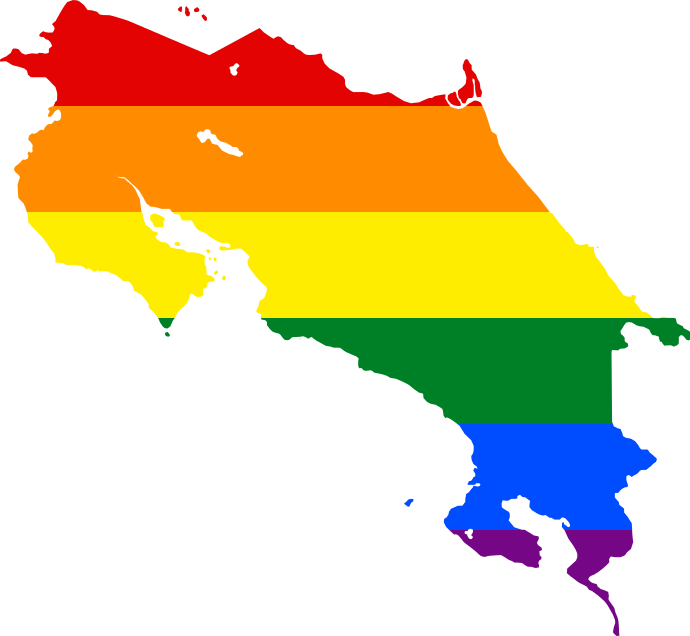As a regular watcher of Latin America, come Monday morning I usually expect to read about the terrible things that almost inevitably occur every weekend. In a region so vast and unstable, there’s bound to be a riot, a corruption scandal, a police crackdown, the shooting of innocent bystanders, or at least an earthquake or mudslide, somewhere.
Because when Murphy wrote, “Anything that can go wrong will go wrong,” he must have been talking about Latin America.
And while a few things did go wrong this past weekend —in Colombia, in Brazil (twice), and something just flat-out crazy in Bolivia— a story came out of Costa Rica that put a big smile on my face and showed that, for all its faults, Latin America might still be on the path to a better, brighter future.
On Saturday, to mark the day in 1990 when the World Health Organization removed homosexuality from its list of mental illnesses, the newly-elected president of Costa Rica, Luis Guillermo Solís, raised the rainbow flag over the Casa Presidencial.


The International Gay and Lesbian Human Rights Commission said it was the first time a head of state has raised the flag from their offices in the Americas.
Only a day before this happened I was bummed out by these interactive charts published by The Guardian that compared gay rights all around the world. Europe looks pretty damn tolerant — I dare say accepting even — compared to Africa and Asia. Of course, Canada is the golden child in North America, granting full legal equality to gays and lesbians, meaning they can have consensual sex, get married, adopt children, and are protected against workplace discrimination and hate crimes. The United States, on the other hand, is still getting there.
As you might expect, legal rights for the LGBT community in Latin America run the gamut from European (in Uruguay) to nonexistent (in Belize and the Lesser Antilles, where sodomy is still a crime).
But, like in the United States itself, progress has been made in recent years, suggesting more and more countries will treat their gay and lesbian citizens the way Canada does, hopefully sooner rather than later.
Argentina became the first Latin American nation to legalize same-sex marriage in 2010. At the time Cardinal Jorge Bergoglio, archbishop of Buenos Aires and soon-to-be Pope Frankie, called it a “destructive attack on God’s plan”—to which Pres. Cristina Fernández de Kirchner said, “It would be a terrible distortion of democracy if they denied minorities their rights.”
Same-sex marriage is legal only in Mexico City (since 2010) and Quintana Roo (since 2012), but same-sex civil unions are legal in a few other Mexican states. Plus all states are required to recognized same-sex marriages performed in other states.
Brazil and Uruguay both legalized same-sex marriage last year, though Uruguay and Argentina have gone further by granting adoption rights to same-sex couples and allowing transgender citizens to legally change their names and genders without surgery or judicial review.
Despite these advancement in LGBT rights, Latin America still has a long way to go before it can be considered a region that treats its gay and lesbian citizens justly.
Several countries have bans on same-sex marriage written into their constitutions, including the “free” and “open” societies of Venezuela, Ecuador and Bolivia. In fact not one of the nine self-styled progressive members of ALBA has legalized same-sex marriage.
Honduras has constitutional bans on same-sex marriage and same-sex adoption rights, but then again, there aren’t many rights in Honduras to begin with, where the right to remain silent is more of an order.
Nevertheless, as I said at the top, Latin America’s moving in the right direction, and there were signs of that all over the region this past Saturday.
Gays and lesbians gathered in the capital city of Paraguay to participate in a “marathon of kisses.” Hundreds gathered in front of the Metropolitan Cathedral in Buenos Aires to protest the Church’s stance against the LGBT community. Various celebrations in honor of International Day Against Homophobia and Transphobia (May 17) took place in Mexico, Chile and Puerto Rico.
But nothing tops the rainbow flag flying over the Casa Presidencial in Costa Rica.
And the Costa Rican president didn’t stop at that, tweeting:
Esta es la casa de todas y todos los costarricenses, con igualdad de derechos sin ninguna discriminación.
— Luis Guillermo Solís (@luisguillermosr) May 16, 2014
Vamos a luchar muy fuerte contra toda forma de discriminación. Buscaremos sin descanso una sociedad inclusiva y respetuosa. — Luis Guillermo Solís (@luisguillermosr) May 16, 2014
It’s your move, Mr. Obama.
***
Hector Luis Alamo, Jr. is a Chicago-based writer. You can connect with him @HectorLuisAlamo.



[…] Gay Pride in Latin America. As a regular watcher of Latin America, come Monday morning I usually expect to read about the terrible things that almost inevitably occur every weekend. In a region so vast and unstable, there's For news and information for gay and lesbian tourists to the Canary Islands, as well as information about the CanaryGay app and books about the Canary Islands: http://www.thegaycanaries.com Click below to find out more about gay life on the Canary Islands on our iPhone App: https://itunes.apple.com/gb/app/canarygay/id650751647?mt=8&uo=4 Click on the link below to download from the Google Play Store:http://play.google.com/store/apps/details?id=com.appmakr.app844588 … […]
I really liked your article , your article is very petrified me in the learning process and provide additional knowledge to me , maybe I can learn more from you , I will wait for your next article article , thanks
http://yakuza4d.com/peraturan
http://yakuza4d.com
http://yakuza4d.com/home
http://yakuza4d.com/daftar
http://yakuza4d.com/cara_main
http://yakuza4d.com/hasil
http://yakuza4d.com/buku_mimpi
http://beritamedannews.blogspot.com
http://www.cintaberita.com
http://yakuza4d2.com
http://yakuza4d2.com/promo
http://yakuza4d2.com/daftar
http://yakuza4d2.com/cara_main
http://yakuza4d2.com/hasil
http://yakuza4d2.com/buku_mimpi